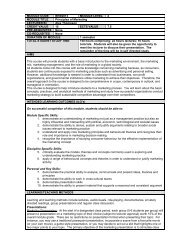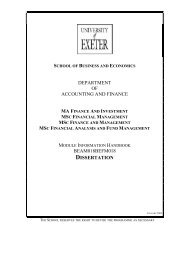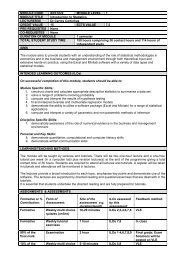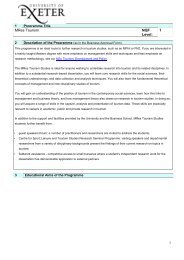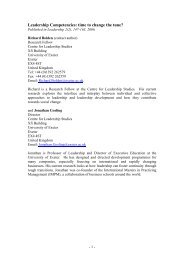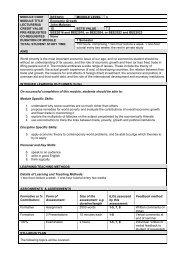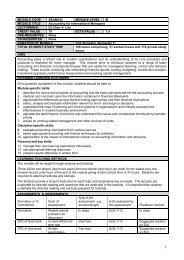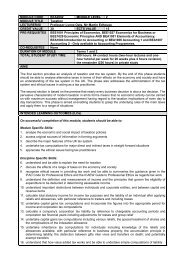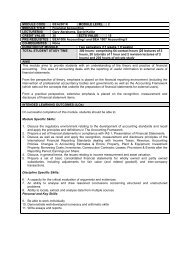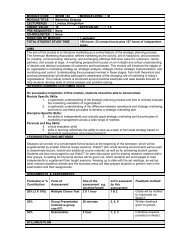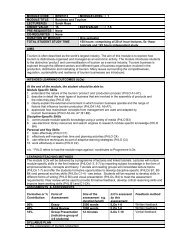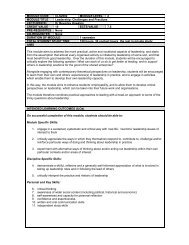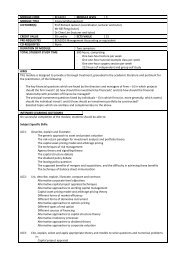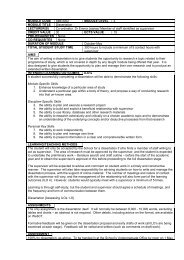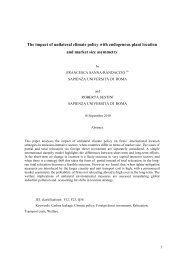What is Leadership? - The Business School - University of Exeter
What is Leadership? - The Business School - University of Exeter
What is Leadership? - The Business School - University of Exeter
You also want an ePaper? Increase the reach of your titles
YUMPU automatically turns print PDFs into web optimized ePapers that Google loves.
<strong>The</strong> Future <strong>of</strong> <strong>Leadership</strong><br />
To conclude th<strong>is</strong> report we would like to<br />
consider future trends in leadership.<br />
<strong>Leadership</strong> Society and the Next<br />
Ten Years<br />
To begin we will present a piece research<br />
conducted by the Centre for <strong>Leadership</strong><br />
Studies on behalf <strong>of</strong> the Windsor<br />
<strong>Leadership</strong> Trust (Bolden and Gosling,<br />
2003). Th<strong>is</strong> work reviewed the<br />
outcomes <strong>of</strong> Initial Windsor Meetings<br />
(IWM) run from November 2001 to May<br />
2003, which give experienced leaders<br />
from all sectors <strong>of</strong> society a week to<br />
reflect on, d<strong>is</strong>cuss and explore the<br />
questions and challenges <strong>of</strong> leadership.<br />
A total <strong>of</strong> 17 syndicate reports were<br />
reviewed, each compiled by 6-8<br />
participants. <strong>The</strong> common theme during<br />
th<strong>is</strong> period was “leadership, society and<br />
the next ten years”. <strong>The</strong> nature <strong>of</strong><br />
participants means that th<strong>is</strong> group <strong>of</strong>fers<br />
a significant pool <strong>of</strong> expert<strong>is</strong>e,<br />
constituting the views <strong>of</strong> well over 100<br />
senior managers from a diverse cross<br />
section <strong>of</strong> organ<strong>is</strong>ations and occupations<br />
in the UK and beyond.<br />
<strong>The</strong> changing nature <strong>of</strong> society<br />
All groups gave considerable attention to<br />
changes in the society in which they<br />
operate. <strong>The</strong>re was a general consensus<br />
that Western society <strong>is</strong> undergoing an<br />
unprecedented period <strong>of</strong> change and that<br />
th<strong>is</strong> appears to be accelerating.<br />
Technological advances are transforming<br />
communications and access to<br />
information; the retired population <strong>is</strong><br />
growing whilst the working population<br />
dimin<strong>is</strong>hes; global economies are<br />
becoming increasingly interdependent;<br />
the ethnic and religious mix <strong>is</strong><br />
transforming; the divide between the<br />
haves and have-nots <strong>is</strong> widening. <strong>The</strong>re<br />
<strong>is</strong> an improved awareness <strong>of</strong> the social<br />
and environmental impacts <strong>of</strong> our<br />
actions; a decreasing allegiance to<br />
traditional power structures; an<br />
increasing complexity with regards to<br />
stakeholders and dec<strong>is</strong>ion-making; a<br />
move from family groups to<br />
individual<strong>is</strong>m; increasing customer (and<br />
employee) demands; and a climate <strong>of</strong><br />
change and uncertainty.<br />
<strong>The</strong> changing nature <strong>of</strong> work<br />
<strong>The</strong> changes in society are impacting<br />
significantly upon the nature <strong>of</strong> work and<br />
the workforce. <strong>The</strong>re <strong>is</strong> a trend towards<br />
flexible working (including part-time,<br />
working from home and the mobile<br />
<strong>of</strong>fice). Decreasing job security,<br />
company loyalty and unemployment are<br />
encouraging mid-life career changes and<br />
self-employment. Demographic changes<br />
and global trade are leading to sectoral<br />
shifts from manufacturing and<br />
production to service and le<strong>is</strong>ure<br />
industries. <strong>The</strong>re are an ever-increasing<br />
number <strong>of</strong> stakeholders (<strong>of</strong>ten with<br />
conflicting demands) and an increasing<br />
pressure to work in collaboration and to<br />
establ<strong>is</strong>h partnerships. Private sector<br />
organ<strong>is</strong>ations are becoming more<br />
powerful and influential in areas<br />
previously controlled by the public<br />
sector, such as pensions, transport and<br />
healthcare.<br />
<strong>The</strong> changing face <strong>of</strong> leadership<br />
In th<strong>is</strong> climate <strong>of</strong> change, leadership <strong>is</strong><br />
viewed as the key to organ<strong>is</strong>ational<br />
success. Although the core qualities <strong>of</strong><br />
leaders may remain constant, the<br />
manner and mix in which they are<br />
exhibited needs to become more fluid<br />
and matched to the context. <strong>The</strong> leader<br />
needs to become increasingly adaptable<br />
– making sense <strong>of</strong> uncertainty and<br />
managing complexity. <strong>The</strong> qualities <strong>of</strong><br />
openness, empathy, integrity and selfawareness<br />
are coming to the fore and<br />
demand a more participative leadership<br />
style, whereby the leader not only<br />
involves colleagues, but l<strong>is</strong>tens, <strong>is</strong><br />
responsive to feedback and delegates<br />
responsibility. <strong>The</strong> leader will<br />
increasingly need to “win the right to<br />
lead”, “lead from the front”, “lead by<br />
example” and be prepared to “share in<br />
hardship”. Developing a culture <strong>of</strong><br />
leadership in which people can excel <strong>is</strong><br />
being seen as increasingly important, as<br />
<strong>is</strong> the need to create and communicate a<br />
shared long-term v<strong>is</strong>ion.<br />
As the need for good strategic leadership<br />
becomes critical, it <strong>is</strong> proposed that<br />
further steps need to be taken to<br />
identify, develop and support potential<br />
future leaders from an early stage. <strong>The</strong><br />
emphas<strong>is</strong> should be on experiential and<br />
reflective learning that builds upon<br />
www.leadershipsouthwest.com 28



